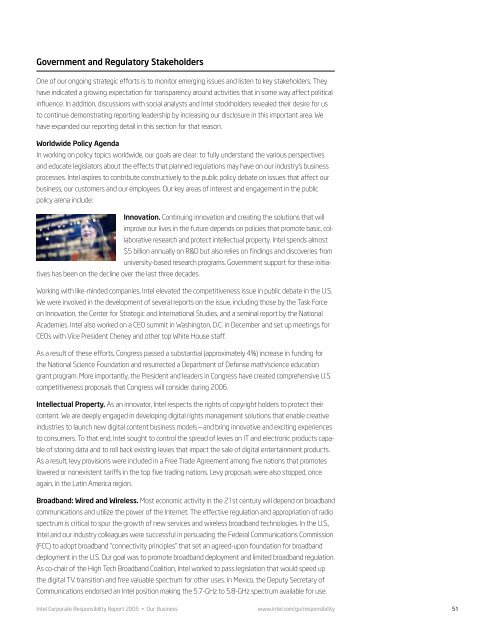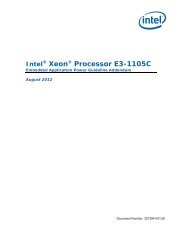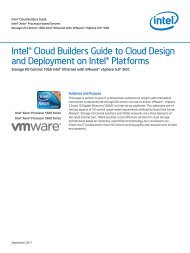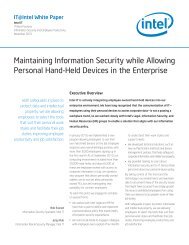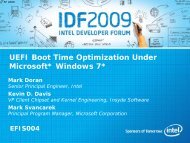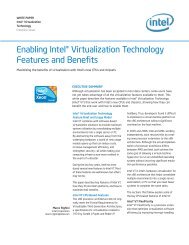Download - Intel
Download - Intel
Download - Intel
Create successful ePaper yourself
Turn your PDF publications into a flip-book with our unique Google optimized e-Paper software.
Government and Regulatory Stakeholders<br />
One of our ongoing strategic efforts is to monitor emerging issues and listen to key stakeholders. They<br />
have indicated a growing expectation for transparency around activities that in some way affect political<br />
influence. In addition, discussions with social analysts and <strong>Intel</strong> stockholders revealed their desire for us<br />
to continue demonstrating reporting leadership by increasing our disclosure in this important area. We<br />
have expanded our reporting detail in this section for that reason.<br />
Worldwide Policy Agenda<br />
In working on policy topics worldwide, our goals are clear: to fully understand the various perspectives<br />
and educate legislators about the effects that planned regulations may have on our industry’s business<br />
processes. <strong>Intel</strong> aspires to contribute constructively to the public policy debate on issues that affect our<br />
business, our customers and our employees. Our key areas of interest and engagement in the public<br />
policy arena include:<br />
Innovation. Continuing innovation and creating the solutions that will<br />
improve our lives in the future depends on policies that promote basic, collaborative<br />
research and protect intellectual property. <strong>Intel</strong> spends almost<br />
$5 billion annually on R&D but also relies on findings and discoveries from<br />
university-based research programs. Government support for these initiatives<br />
has been on the decline over the last three decades.<br />
Working with like-minded companies, <strong>Intel</strong> elevated the competitiveness issue in public debate in the U.S.<br />
We were involved in the development of several reports on the issue, including those by the Task Force<br />
on Innovation, the Center for Strategic and International Studies, and a seminal report by the National<br />
Academies. <strong>Intel</strong> also worked on a CEO summit in Washington, D.C. in December and set up meetings for<br />
CEOs with Vice President Cheney and other top White House staff.<br />
As a result of these efforts, Congress passed a substantial (approximately 4%) increase in funding for<br />
the National Science Foundation and resurrected a Department of Defense math/science education<br />
grant program. More importantly, the President and leaders in Congress have created comprehensive U.S.<br />
competitiveness proposals that Congress will consider during 2006.<br />
<strong>Intel</strong>lectual Property. As an innovator, <strong>Intel</strong> respects the rights of copyright holders to protect their<br />
content. We are deeply engaged in developing digital rights management solutions that enable creative<br />
industries to launch new digital content business models—and bring innovative and exciting experiences<br />
to consumers. To that end, <strong>Intel</strong> sought to control the spread of levies on IT and electronic products capable<br />
of storing data and to roll back existing levies that impact the sale of digital entertainment products.<br />
As a result, levy provisions were included in a Free Trade Agreement among five nations that promotes<br />
lowered or nonexistent tariffs in the top five trading nations. Levy proposals were also stopped, once<br />
again, in the Latin America region.<br />
Broadband: Wired and Wireless. Most economic activity in the 21st century will depend on broadband<br />
communications and utilize the power of the Internet. The effective regulation and appropriation of radio<br />
spectrum is critical to spur the growth of new services and wireless broadband technologies. In the U.S.,<br />
<strong>Intel</strong> and our industry colleagues were successful in persuading the Federal Communications Commission<br />
(FCC) to adopt broadband “connectivity principles” that set an agreed-upon foundation for broadband<br />
deployment in the U.S. Our goal was to promote broadband deployment and limited broadband regulation.<br />
As co-chair of the High Tech Broadband Coalition, <strong>Intel</strong> worked to pass legislation that would speed up<br />
the digital TV transition and free valuable spectrum for other uses. In Mexico, the Deputy Secretary of<br />
Communications endorsed an <strong>Intel</strong> position making the 5.7-GHz to 5.8-GHz spectrum available for use.<br />
<strong>Intel</strong> Corporate Responsibility Report 2005 • Our Business<br />
www.intel.com/go/responsibility<br />
51


